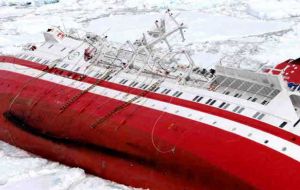MercoPress. South Atlantic News Agency
“Explorer” accident raises environment concerns in Chile
 The Little Red Boat surrounded by packed ice before going down
The Little Red Boat surrounded by packed ice before going down Chilean scientists and environmentalists said Wednesday they hope to determine within the next few days the extent of environmental damage resulting from recent the sinking of the cruise ship S/M Explorer.
The Explorer's tragic accident last Friday in the Antarctic left a 1.5 km oil slick and has led to calls for stiffer sanctions against the cruise ship owners and for greater restrictions on Antarctic tourism. "Aside from the effects of the spilled fuel, we are also worried about parts of the ship such as the painting and the heating and air conditioning systems. Those could definitely affect the Antarctic's marine life," said Samuel Leiba of Greenpeace Chile. On November 23rd the S/M Explorer hit an iceberg located near the South Shetland Islands and the Antarctic peninsula called Graham Land. More than 150 passengers and crew were evacuated safely by lifeboats and then taken to King George Island, where they were clothed, fed, and checked by physicians in Chile's Eduardo Frei Montalva air force base. In spite the severity of the situation, no deaths or injuries were reported, and all of the passengers have since left the country. The vessel sank hours later and now lies on the ocean floor at a depth of some 4,921 feet (1,500 m). Chilean Navy officials carried out surveillance flights over the accident site on Sunday evening and confirmed a 1.5 kilometer long oil slick. This led to their decision to send an icebreaker to both disperse the fuel slick and gather water samples. "Considering the depth, the presence of ice, the effect of the wind and the currents and the absence of technology to contain spills on open seas and at depths of far more than 1,000 meters, the only viable thing to do is to disperse the slick mechanically," a Chilean Navy press release concluded. Still, when officials returned to the accident site on Monday they could still detect a strong presence of hydrocarbons. Although details are still forthcoming, Navy representatives and environmental NGO officials are concerned about the effects that the leak could have on area fauna. The vicinity around the accident site, officials say, is rich in biodiversity and especially well known for its penguin population. "The effects of this sinking are going to be especially severe. The accident site is an area of high and very particular biodiversity, and the marine wildlife is going to suffer," Antonia Fortt, the head of Oceana's Clean Oceans Program, told the Santiago Times. "Damages caused by oil spills are long term because they are so difficult to clean up. Consequently, we are talking about permanent damages to the area's wildlife population." Chilean legislators and government officials also acknowledged the severity of the situation. "This is a very worrisome situation for Chile's government, because the spill occurred in a place of great environmental importance for the whole planet," Ana Lya Uriarte, Chile's highest environmental authority, said through a press release. In an interview with the on-line daily El Mostrador, Sen. Antonio Horvath (RN) emphasized that, at the time of the sinking, the S/M Explorer had more than 185 cubic meters of diesel fuel, 1,000 liters of gasoline, and roughly 24 cubic liters of lubricants. "It is very surprising that there are no means available to effectively respond to this situation," he said. "This boat is now located at a very great depth. If the slick has now risen to the surface, we should move to clean it up before it spreads any farther." Horvath went on say that the ship owners should finance all clean-up operations: "The clean-up can be carried out by Chile's Navy or a private business, but it must be financed by the owners of S/M Explorer." NGOs echoed Horvath's statements and also called for Chile's government to beef up environmental standards for vessels that pass through the Antarctic. "The government should fine the company in order to set an example, so that accidents like this never happen. Aside from paying a significant monetary fine, the company should pay for the clean up of the area," Fort said. "Additionally, because the effects of such a spill are long term, the company should make payments over the span of several years." "Chile's government should demand insurance payments from shipping companies that transport passengers to that part of the region," Leiba said. "We understand that there is increased tourism to the region. But that tourism needs to be more regulated and there must also be greater consequences (?) for example, the S/M Explorer's accident happened at night. The alarms and the security system evidently did not work, and the ship ended up crashing with an iceberg. If ships are not equipped to travel at night, then there should be restrictions." By Matt Malinowski The Santiago Times




Top Comments
Disclaimer & comment rulesCommenting for this story is now closed.
If you have a Facebook account, become a fan and comment on our Facebook Page!